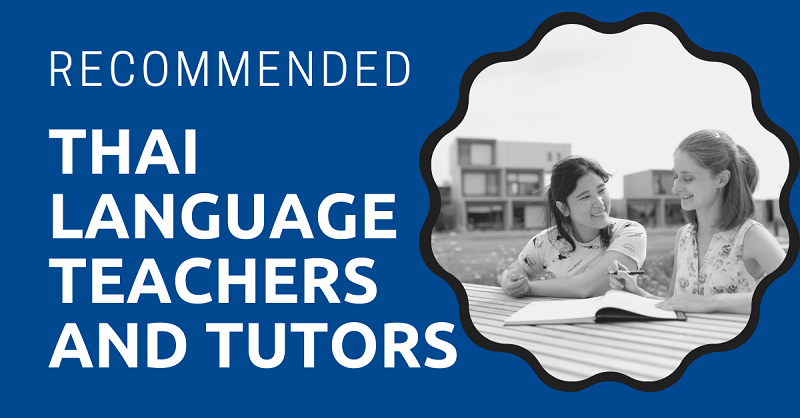
If you are a Thai teacher and would like to be included, send me the below information via our contact page.
To the best of our knowledge the teachers listed here are ethical, experienced Thai teachers. If you disagree, please contact us.
Enter your email below to receive our FREE Thai Language Cheat Sheet. It includes a comprehensive list of downloadable PDFs to quickly get you started learning the Thai language. The Cheat Sheet covers everything, from the alphabet, tone marks, and consonant sounds to vocabulary and much more.
Disclaimer: This article may include links to products or services offered by ExpatDen’s partners, which give us commissions when you click on them. Although this may influence how they appear in the text, we only recommend solutions that we would use in your situation. Read more in our Advertising Disclosure.
Contents
- Thai Skype Teachers...
- Bangkok
- Thai Teacher: Pimpanee Srethaphakdi ( Pimmy )
- Thai Teacher: Adjima Thaitrong (Mod)
- Name: Kruu Kate
- Thai Teacher: Lek (Pornchai Leelapornchai)
- Thai Teacher: Noi Naa (Parisa Koknoi)
- Thai Teacher: Pongnuch Jayaphorn
- Thai Teacher: Rungthip Srisopha
- Name: Sumet Jirakasemwat (Met)
- Thai Teacher: Tanya
- Thai Teacher: Tip (Sarintip)
- Thai Teacher: Ung
- Thai Teacher: Voraphot (Bank)
- Phuket
- Khon Kaen
- Chiang Mai
- Other
- What to Read Next
Thai Skype Teachers…
More Thai Skype teachers can be found at italki or Learn Thai via Skype: Locating Teachers and Schools.
Bangkok
Thai Teacher: Pimpanee Srethaphakdi ( Pimmy )
- Email: [email protected]
- Phone: +66-84-5352247
- Location: Sukhumvit area and office location as necessary. I’m also available on Skype.
- Time: 09.00am – 8.00pm ( Monday to Friday )
Teaching materistals: Books from Top Thai Language Institute and custom teaching materials based on student’s intere
*If you are an ExpatDen premium subscribers, you also get a free online class with me.
Thai Teacher: Adjima Thaitrong (Mod)
- Website: Learn Thai With Mod
- Email: [email protected]
- Teaches via Skype: Go to Learn Thai via Skype: Locating Teachers and Schools
- Phone: 083-7890361
- Location: Asoke, Bangkok and office locations as necessary
- Times: 9 a.m.-7 p.m. Monday – Friday
Teaching materials: Benjawan Poomsan Becker books, Paiboon Publishing and tailor-made materials
Name: Kruu Kate
- Email: [email protected]
- Facebook: Learn Thai With Kate
- Phone: 083-012-1631
- Location: Near BTS, office locations and online through skype , face time
- Times: 7 a.m.- 8 p.m. Monday – Sunday (Bangkok Time +7 GMT ICT Time Zone)
- Payment method: Paypal or cash payment
Teaching materials: Benjawan Poomsan Becker books and specially designed courses to meet each learner’s needs.
Hello… I am an experienced native Thai teacher. I have been teaching Thai for foreigners since 2011, starting from oversea and now in Bangkok. Feedback from my students is highly positive. You can ensure that you will be able to correctly use Thai language with confidence after learning Thai with me. Learn Thai language with me and communicate well like a Thai.
Thai Teacher: Lek (Pornchai Leelapornchai)
- Email: [email protected]
- Phone: 0816550604
- Location: Bangkok (downtown and any place accessible by public transportation), NakornPathom
- Times: Evenings, weekends or as agreed
- Teaching materials: Self-developed upon each student’s status
Thai Teacher: Noi Naa (Parisa Koknoi)
- Email: [email protected]
- Phone: 082-383-3857
- Website: Thai With Noi Naa
- YouTube Channel: Speak Thai With Noi Naa
- Teaches via Skype: Go to Learn Thai via Skype: Locating Teachers and Schools
- Location: Chiang Mai
- Times: 6-10 pm M-F, and 9am-10pm Sat-Sun
Teaching materials: “Thai for Beginners”, “Thai for Intermediate Learners”, & “Thai for Advanced Readers” by Benjawan Poomsan Becker; “Essential Thai” by James Higbie; and my own material.
I offer a free 30 minute trial lesson, and if the student pays for 10 lessons in advance, they get an extra lesson free.
Thai Teacher: Pongnuch Jayaphorn
- Email: [email protected]
- Phone: 0851702720
- Location: Ladprao, Wangtonglang
- Times: Mon-Fri 9am-4pm
- Teaching materials: Sheets provided
- Thai Teacher: Prang
- Email: [email protected]
- Phone: 089-5798226
- Location: Bangkapi, Ramkhamheang, Ladpao, Sukhumvit, (downtown and any public place)
- Times: Evenings,a day on weekends or comfortable your time.
- Teaching materials: worksheet
Thai Teacher: Rungthip Srisopha
- Email: [email protected]
- Phone: 097-157-7535
- Location: Bangkok, near BTS and MRT
- Times: week day 6pm+ or Sat & Sun
Teaching materials: Benjawan’s books, Everyday Thai for Beginner and my materials that will suit to my students.
Name: Sumet Jirakasemwat (Met)
- Email: [email protected]
- Skype: [email protected]
- Facebook: good2thaionline
- Teaches via Skype: Go to Learn Thai via Skype: Locating Teachers and Schools
- Phone: +66869775334
- Location: Nearby BTS/MRT stations in BKK or Skype
- Times: Monday – Friday (after 6.00 pm) and Saturdays
Teaching materials: Benjawan Poomsan Becker books, Thai- an Essential Grammar by David Smyth and Effective tailor-made Thai lessons and exercises for each student with different Thai language levels.
Sa-wàt-dii khráp, my name is Sumet, an Experienced Native Thai Teacher. I have been teaching Thai to foreigners since 2010, starting from Australia and now in Bangkok, Thailand. I am a qualified Thai teacher with a teaching certificate of Thai teaching to foreigners from TPA of Thailand.
I can teach Thai language in all communication skills (Listening, Speaking, Reading and Writing) from basic to advanced levels.
You can ensure that you will be able to correctly and properly use Thai language with confidence after learning Thai with me. I have an experience in both theoretical and practical ways in teaching Thai to foreigners, and I always love my Thai classes being fun and effective. Let’s learn Thai language with me and communicate well like a Thai!!
Thai Teacher: Tanya
- Website: Hello Learn Thai
- Location: Bangkok, Thailand
- Teaches via Skype: Go to Learn Thai via Skype: Locating Teachers and Schools
- Times: 24/7 (UCT+07:00 Bangkok Time Zone)
- Payment method: Paypal or credit card
Teaching materials: Self published materials to suit the students needs.
We offer a wide range of Thai language courses from beginner to advanced. We offer 1-on-1 live online Thai lessons through Skype at the right level for students, no matter how much or little Thai the student knows. Even if students have never learned Thai before, the courses will enable them to communicate effectively in the Thai language.
Thai Teacher: Tip (Sarintip)
- Email: [email protected]
- Phone: 087-8101880
- Website: Magic Thai
- Location: Bangkok (all locations)
- Times: 6am – 11pm
- Teaching materials: Tailored to each student
- Teaches via Skype: Go to Learn Thai via Skype: Locating Teachers and Schools
Thai Teacher: Ung
- Email: [email protected]
- Phone: 084-897-5522
- Teaches via Skype: Go to Learn Thai via Skype: Locating Teachers and Schools
- Location: Bangkok
- Times: As agreed
Teaching materials: HighSpeedThai and my own material that suits each student’s need.
- Suitable for students who seriously aim to read Thai, cross over just simple conversation and use this quality to enhance your self-study and real local experience.
- Always interesting and exciting.
- Flexible schedule and payment.
- Risk free payment scheme and money back guarantee option.
I also provide language consultancy to anyone who self-studies and needs a Thai native to practice with, test, give pronunciation assessment, or clarify specific questions.
Thai Teacher: Voraphot (Bank)
- Email: [email protected]
- Phone: 086-3616356,081-8073199
- Location: Bangkok
- Times: As agreed
- Payment: Bank transfer
Teaching materials: Tailored to each student
Hi, Sawadee krub, my name is Voraphot and you can call me “Bank”. I live in Bangkok and I teach foreigners Thai. I focus on understanding the personalities of my students, matching their character to a compatible teaching style. In this way, students feel happy and enthusiastic about learning. To develop a student’s Thai skills, I teach using Thai course books, Thai games, and situational Thai. My aim is to give students the best learning experience!
Phuket
Thai Teacher: Chirana Chiraksa (Aina)
- Email: [email protected]
- Phone: 084-304-1166
- Location: Phuket, Thailand (Kathu, Patong, Kamala, Bangtao, Cherng Talay, Thalang, Airport)
- Times: 9 a.m. – 4 p.m. Monday-Sunday (Bangkok Time +7 GMT ICT Time Zone)
Teaching materials:
- Conversation Lesson: Tailor-made materials to meet each student’s needs.
- Writing & Reading Lesson: Tailor-made materials to meet each student’s needs.
- Thai primary/secondary school textbooks.
- Thai Basic reading books.
- Free programs for writing & reading Thai.
Thai Teacher: Kru Mint
- Email: [email protected]
- Phone: 081-8924188
- Location: Phuket, Thailand and Online through Skype or Line
- Teaches via Skype: Go to Learn Thai via Skype: Locating Teachers and Schools
- Times: Flexible – As agreed (Bangkok Time +7 GMT ICT Time Zone).
- Payment method: Paypal/Cash
Teaching materials:
- Thai for Beginners in Speaking and Listening (Conversation Lesson)
- Writing & Reading Lesson
- Materials in PDF files, Basic text, pictures, music, newspapers, etc.
- Self-developed upon each student’s status
I graduated in degree of Thai language (First-class honors). I have 2 years experience teaching Thai as a foreign language and now I’m working full-time as a freelance language instructor from my own convenient private classroom in Phuket, and I am teaching over Skype with foreign students from another countries.
Feel free to contact me for further information.
Khon Kaen
Thai Teacher: Kru Aw (Tipsuda Rerkma)
- Email: [email protected]
- Phone: 0895695192
- Facebook: Amazing grace Thai-Isan tutor in Khon Kaen
- Teaches via Skype: Go to Learn Thai via Skype: Locating Teachers and Schools
- Location: Khon Kaen (near Khon Kaen university)
- Times: 9.00 am – 6.00 pm. Monday – Saturday and flexible-as agreed.
- Payment method: Cash
Teaching materials: I normally provide a year course for missionaries in Isan so I have self-built curriculum with materials and I also use many books and texts, pictures and cards.
Promotion** One on one Thai for beginner course 12 hours/3,600THB (more than 1 student will be 3,000THB per person/course)
Thai Teacher: Kru Kat
- Email: [email protected]
- Phone: 088-562-1041
- Teaches via Skype: Go to Learn Thai via Skype: Locating Teachers and Schools
- Location: Kranuan, Khon Kaen and Online through Skype, Line, FaceTime, etc.
- Times: All
- Payment method: Paypal/Cash
Teaching materials: Student’s own materials supplemented with teacher’s/online links and games.
As a person who is half Thai and half American who is also fluent in English, Thai, and Isan, I have a diverse background with much to offer. I can translate emails, documents, etc. and am an able interpreter. I also specialize in teaching the Isaan dialect of northeast, Thailand.
Feel free to call to negotiate rates.
Chiang Mai
Thai Teacher: Kru Jan
- Website: StudyThai.org
- Facebook: Study Thai with Kru Jan
- Teaches via Skype: Go to Learn Thai via Skype: Locating Teachers and Schools
- Email: [email protected]
- Location: Nimmanhaemin, Chiang Mai
- Times: Flexible – As agreed.
Teaching Materials: Flexible – As agreed.
Self-built curriculum with materials tailored towards your requirements.
Hi! I’m a former teacher of licensed Thai language schools with a BA(Hons) in Linguistics from Chiang Mai University.
I have over 5 years professional experience teaching Thai as a foreign language and now work full-time as a independent freelance tutor from my own convenient private classroom in Nimman, Chiang Mai. I can also teach over Skype.
Don’t be shy! I’m super-friendly and fluent in English. No question is too difficult. Visit my website for more details on lessons and join my Facebook group!
Other
Thai Teacher: Kelly
- Website: Rian Thai Kab Kelly
- Facebook: Rian Thai Kab Kelly
- Email: [email protected]
- Location: Singapore
- Times: 9 a.m. – 9 p.m. Sunday – Friday
Teaching materials: Tailor-made materials for conversation lessons, Thai primary school/secondary school textbooks as reference for writing and reading Thai.
Hello! I have been teaching Thai lessons privately since 2007. I had so much satisfaction that I had left my full time position in a large MNC in order to pursue my dream – sharing with foreigners how beautiful everything about Thailand is. I have developed my own textbooks to be used during the lessons. Feedback from my students are highly positive. You can go check out my blog for some fun facts about Thai too!
Thai Teacher: Khun Pari
- Email: [email protected]
- Phone: +46700269699
- Location: Stockholm, Sweden
- Times: upon your request, Central European Time Zone(UTC+01:00)
Teaching materials: Thai for Beginners, materials in PDF files, Words, pictures, music, newspapers, etc. Daily Thai conversations to build up your vocabulary.
Thai Teacher: Kru Nern
- Email: [email protected]
- Phone: +15402299597
- Location: Baltimore, Maryland, USA
- Times: up to student’s schedule
- Teaching materials: Berlitz / custom made
Thai Teacher: Titcha Kedsri
- Email: [email protected]
- Phone: 1(347)280-6205
- Website: Practical Thai
- Teaches via Skype: Go to Learn Thai via Skype: Locating Teachers and Schools
- Location: New York, USA
Teaching materials: Benjawan Poomsam Becker’s Thai for Beginners and David
Smyth’s Thai: An Essential Grammar
Thai Teacher: Watcharee Suebkhajorn (Lukkae)
- Email: [email protected]
- Phone: +66806611434
- Skype: wsuebkhajorn
- Location: Thailand
- Times: Monday-Friday (08:00-15:00 and after 18:00) Saturday-Sunday (11:00-13:00 and after 16:00)
Teaching materials: Tailor-made base on each student’s level and summarize after class. Voice record for listening skill. Any as preferable.
Thai Teacher: Yuki Tachaya
- Email: [email protected]
- Website: Pick Up Thai
- YouTube: pickupthai
- Twitter: @PickupThai
- Teaches via Skype: Go to Learn Thai via Skype: Locating Teachers and Schools
- WLT Guest Author posts: Yuki Tachaya
- Location: Los Angeles & Bangkok
- Times: Monday-Sunday, 8am-9pm
- Payment method: Paypal/Cash/Bank transfer
Teaching material: Please look at my website for more details.
Thai Teachers: Thai Style Language Co. Ltd. (Head Teacher Kruu Jiab)
- Email: [email protected]
- Phone: (+66) 083 046 1003 (+44) 020 3289 5550
- Website: learnthaistyle.com
- Facebook: LearnThaiStyle
- Twitter: LearnThaiStyle
- YouTube: ThaiStyleLanguage
- WLT Guest Author posts: Kru Jiab
- Also teaches via Skype: Go to Learn Thai via Skype: Locating Teachers and Schools
- Location: Teachers come to you. Hundreds of locations available across Thailand, the UK, USA, Singapore & Australia
- Times: Flexible class times available
- Payment method: Register online then pay your teacher directly for as many hours as you want to learn.
Teaching materials: Structured worksheets/workbooks accompanied by audio, video, quizzes, smart flash cards, self study materials, a learn Thai blog, head teacher support and many more learner services.
Over 900 trained Thai teachers to choose from. Learn in-person face to face and/or online via Skype.
If you are a Thai teacher and would like to be included, send us the below information via our contact page:
Thai Teacher:
Email:
Phone:
Website:
Location:
Times:
Payment method:
Teaching materials:
Skype? If yes, then please complete the information needed for Learn Thai via Skype: Locating Teachers and Schools







